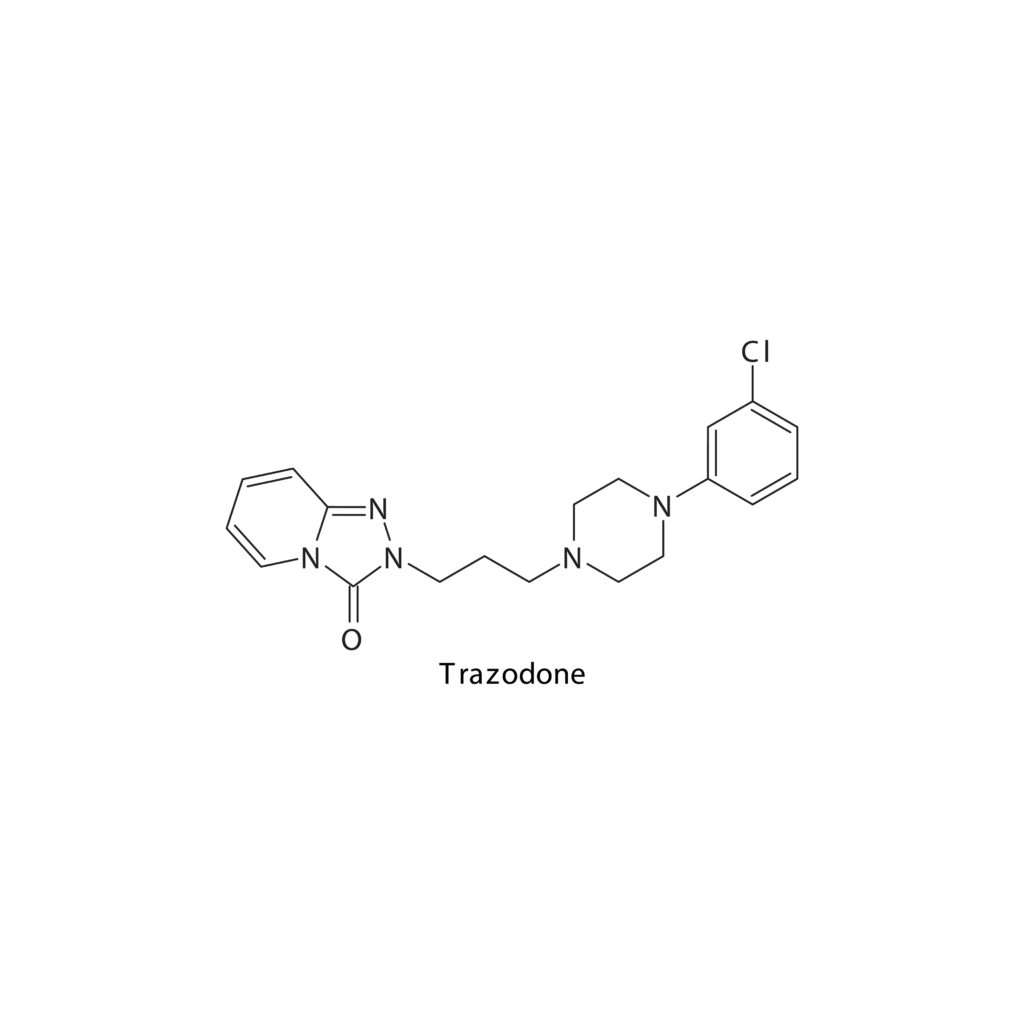What is Trazodone?
Trazodone is a prescription drug also known as Oleptro, dividose, and desyrel. Trazodone treatment was originally intended for patients who are experiencing major depressive disorders. Physicians would come to find out that the sedative reactions that occur when taking trazodone were beneficial for individuals needing sleep aids due to struggling with sleep disturbances such as insomnia or sleep apnea. The sedating effects from taking trazodone have also been found to be effective methods of treating other medical conditions including anxiety disorder, fibromyalgia, and symptoms of alcohol withdrawal.

Trazodone is a prescription medication that is classified as a serotonin reuptake inhibitor (SARIs). Serotonin is a neurotransmitter within the brain that is responsible for mood stabilization and emotion regulation. Individuals with an adequate level of serotonin will be able to manage any distressing emotions without turning to negative patterns or moods. However, if you are experiencing low levels of serotonin, you are more likely to experience the serious side effects of depressive disorders, anxiety disorders, and other mood altering disorders. Taking trazodone will help to increase an individual’s serotonin levels which will ultimately aid in regular, emotional regulation and mood stability.
What are Trazodone Side Effects?
When you are prescribed trazodone for a major depressive disorder there will be noticeable benefits from taking trazodone. Individuals will begin to notice an increase in your ability to regulate your emotions, reduce the common side effects of major depressive disorders, and function throughout the day while maintaining your emotional well-being. This is because trazodone can cause an increase in your natural transmitter’s ability to restore and revive the chemical compounds that are responsible for your serotonin levels and create a serotonin reuptake.
If you are taking trazodone as a sleep aid, trazodone can cause an individual to fall into a sedative state which increases the likelihood of you feeling sleepy or drowsy allowing you to fall asleep and remain sleeping for a restful night’s sleep.
Signs of Trazodone Abuse and Addiction
If you are concerned about you or a loved one developing an addiction to Trazodone, there are common side effects and symptoms to be aware of to know when it is time to seek support from an addiction treatment program. Common signs of an addiction to trazodone are:
- Taking trazodone even after you endure negative or painful consequences
- Loss of interest in social circles, hobbies, or activities that once brought you joy
- Finding ways to get trazodone without having a prescription for it
- Taking trazodone outside of the recommended dose for longer than you were prescribed
- Going to multiple doctors to obtain trazodone prescriptions
- Stealing prescriptions or money from others to continue to feed your drug addiction
- Mixing substances with trazodone to increase the levels of sedation or high you feel
- Your time is dedicated to thinking, planning, and recovering from taking trazodone
- Having to use more trazodone to reach the same desired level of high and euphoria
- Inability to maintain work, school, or family responsibilities due to your substance abuse
Trazodone Withdrawal Symptoms
When you begin your trazodone detox, the length of time you will be in trazodone detox will be dependent on your history of trazodone abuse. The longer you have been engaging in substance abuse and the larger quantities you are taking trazodone in will impact the severity of your trazodone withdrawal symptoms. Individuals in trazodone detox may experience some of the following withdrawal symptoms:
- Dizziness
- Nausea/Vomiting
- Suicidal thoughts or ideations
- Ringing in the ears
- Trouble sleeping
- Blurred vision
- Nervousness
- Numbness
- Confusion
- Chest pain
- Difficulty breathing
- Erectile dysfunction
- Fainting
- Headache
- Lightheadedness
- Panic attack
- Rash
- Seizure
- Sweating
Long Term Side Effects of Trazodone Abuse
Similar to other substance use disorders, if you engage in prolonged trazodone abuse, there is an increased risk for developing long term physical and mental health concerns and side effects. Engaging in an addiction treatment program will support you in addressing and overcoming long term side effects with the support of medical professionals and addiction counselors. Common long term side effects of trazodone abuse are:
- Auditory learning issues.
- Equilibrium difficulties
- Memory lapses or memory loss
- Confusion or delirium
- Glaucoma.
- Blurred vision or difficulty with vision
- Hypotension.
- Fainting or lightheadedness
- Poor coordination
- Hand or body Tremors.
- Gastrointestinal problems
- Abnormal heart rate and rhythm
Trazodone Addiction Treatment
Novo Detox treatment centers provide patients with varying levels of care that will support you in treating and healing from your substance use disorders. Patients can choose from inpatient rehab or outpatient rehab options that will provide you with a treatment plan that fits within your lifestyle and current needs for addiction treatment support. Patients will be provided the option to attend a medical detox before entering into drug rehab. A medical detox will allow you to safely address and overcome the physical dependence that has developed within your addiction to trazodone.
Once your medical detox is completed, you will be able to transition into substance abuse treatment programs where you will be supported with evidence based therapy methods to address your underlying emotions and causes that have been fueling your drug addiction. With the support of behavioral therapy, medically assisted treatment, dual diagnosis treatment, and holistic therapy, patients will be able to heal from your emotions associated with trazodone addiction while gaining the life skills and tools for relapse prevention and living in addiction recovery.
Contact Novo Detox today to find out more about the individualized treatment programs offered and how our team can help you begin your new life of sober living.




